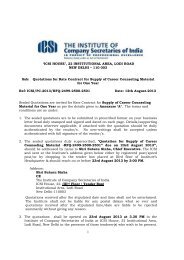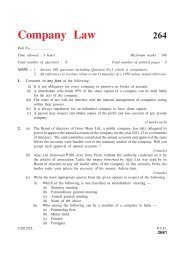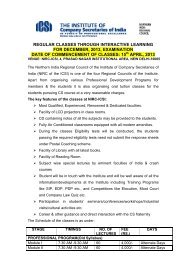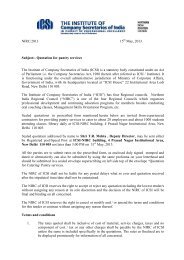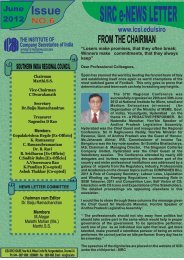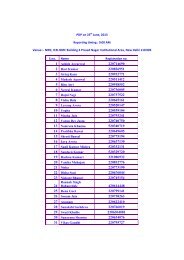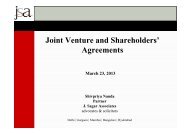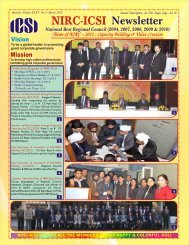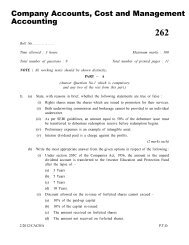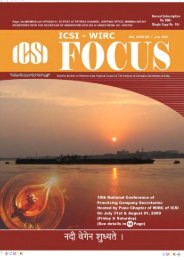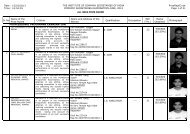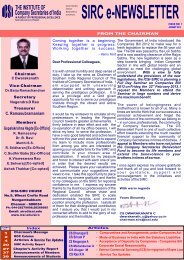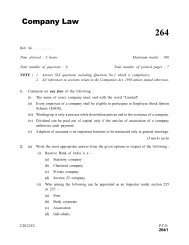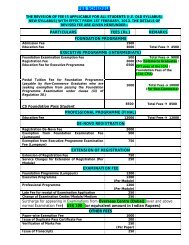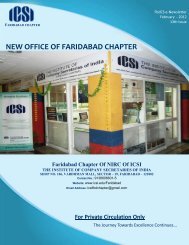April 2013 - Icsi
April 2013 - Icsi
April 2013 - Icsi
Create successful ePaper yourself
Turn your PDF publications into a flip-book with our unique Google optimized e-Paper software.
Legal Updates<br />
appeals, it is accepted that two complaints were made to the SEBI on<br />
4th June, 2007 and 19th July, 2007, but no decision or outcome was<br />
communicated to the respondent. Thus, in the obtaining factual matrix<br />
the only mandamus that could have been issued to the SEBI is to take<br />
a decision on the basis of the complaints filed and communicate the<br />
decision to the complainant respondent. Needless to say, an appeal<br />
would lie from such a decision.<br />
In view of the aforesaid, the order passed by the learned single Judge<br />
is set aside in entirety. SEBI shall examine the complaints and take a<br />
decision and communicate it to the parties.<br />
The first submission of Mr. Soli Sorabjee, learned senior counsel<br />
appearing for the petitioner DLF is that the procedure adopted by the<br />
respondent SEBI while granting hearing to the parties, was completely<br />
flawed and in gross breach of the principles of natural justice. He<br />
submits that the Division Bench had specifically directed in the order<br />
dated 21.07.2011 that SEBI shall arrive at its decision “after hearing<br />
the parties within a period of three months from the date of receipt of<br />
the order passed today”. However, SEBI did not grant a hearing to<br />
the petitioner, inasmuch, as, the complainant i.e. the respondent no.2<br />
was heard first in the absence of the petitioner, DLF, and thereafter<br />
the petitioner was called for a hearing, when respondent no.2 was not<br />
present. Consequently, the petitioner did not have the advantage of<br />
knowing as to what was submitted by respondent no.2 at the hearing<br />
and, therefore, obviously the petitioner could not respond to the<br />
complainant’s submissions.<br />
Mr. Sorabjee submits that such a procedure of holding one sided<br />
hearings has been held by the Supreme Court to be in breach of the<br />
principles of natural justice. In this regard, he places reliance on<br />
Payyavula Vengamma v. Payyavula Kesanna & Ors., Mr. Sorabjee<br />
submits that the act of ordering an investigation under Section 11C<br />
seriously impinges on the reputation and good name of the petitioner,<br />
and an investigation under Section 11C cannot be ordered lightly.<br />
Mr. Sorabjee further submits that an investigation may be ordered by<br />
SEBI under Section 11C of the Securities & Exchange Board of India<br />
Act, 1992 (SEBI Act) in a case where SEBI “has reasonable ground to<br />
believe that:<br />
(a) the transactions in securities are being dealt with in a manner<br />
detrimental to the investors or the securities market; or(b) any<br />
intermediary or any person associated with the securities market has<br />
violated any of the provisions of this Act or the rules or the regulations<br />
made or directions issued by the Board thereunder.<br />
Mr. Sorabjee lastly submits that while passing the impugned order,<br />
the Board has looked into a host of other documents produced by<br />
Respondent No.2 for the first time, and which did not form part of<br />
the original complaints made by him. He submits that the Division<br />
Bench had directed the Board to consider only the two complaints<br />
and in so far as consideration of the additional affidavits filed by<br />
Respondent No.2 in the writ proceedings is concerned, that direction<br />
of the learned Single Judge had been set aside.<br />
He submits that the impugned order is premised on irrelevant materials<br />
and considerations (contained in the additional documents) which<br />
the Division Bench had specifically directed to be kept out of its<br />
consideration by the Board.<br />
Mr. Sorabjee submits that the SEBI has been influenced by these<br />
submissions of respondent no.2/complainant in arriving at its decision<br />
which is assailed in these proceedings. However, the petitioner was<br />
not granted an opportunity to respond to the same.<br />
Observations of the Court:<br />
Having heard learned counsels, perused the impugned order and<br />
considered the submissions of the parties in the light of the case law<br />
cited before me, I am inclined to dismiss the present petition, not on<br />
the ground of the petitioner having an alternative efficacious remedy<br />
under Section 15T of the SEBI Act, but on the ground that the petitioner<br />
did not have a right to hear the submissions of the respondent No. 2<br />
complainant, and it had only the right of making its own submissions<br />
before SEBI, i.e. respondent No. 1 in terms of the order of the Division<br />
Bench . The limited enquiry conducted by SEBI at this stage was<br />
merely to examine whether or not the facts disclosed the entertainment<br />
of a reasonable belief to cause an investigation under Section 11C of<br />
the SEBI Act, which is an inquisitorial exercise, and not an adjudicatory<br />
exercise conducted by SEBI.<br />
(i) Firstly, the case of the petitioner in the present petition is that there<br />
has been a breach of the principles of natural justice by SEBI while<br />
passing the order dated 20.10.2011, thereby concluding that an<br />
investigation under Section 11C of the SEBI Act is required to be held<br />
on the basis of two complaints of respondent No. 2.<br />
(ii) Secondly, it is also the submission of the petitioner that the said<br />
order dated 20.10.2011 has been passed without jurisdiction, i.e. that<br />
the jurisdictional facts, which would give jurisdiction to SEBI to pass<br />
an order requiring an investigation, did not exist in the present case.<br />
(iii) SAT, Mumbai has already taken a view in case of Bhoruka Financial<br />
Services Ltd. (supra), that it is not the requirement of Section 11C that<br />
opportunity of hearing is to be afforded to any intermediary of the<br />
market before ordering an investigation under that Section, on the<br />
ground that such an investigation does not adversely affect any person<br />
or intermediary and no civil consequences flow from such an order.<br />
Therefore, to relegate the petitioner to filing an appeal under Section<br />
15T of the SEBI Act would be of no avail. The Calcutta High Court in<br />
para 33 of its decision in Rose Valley Real Estates and Constructions<br />
Ltd. (supra) itself carves out a few exceptions under which the Court<br />
may exercise its power under Article 226 of the Constitution of India.<br />
(iv) One of the reasons for the Court not exercising jurisdiction under<br />
Article 226 of the Constitution is that the matter involves technicalities,<br />
which are best left to be dealt with by experts in the field.<br />
Compiled by<br />
Ms. Swati Chhabra, LCS–swati@rmgcs.com<br />
CS Manish Gupta, FCS–manish@rmgcs.com<br />
<strong>April</strong>, <strong>2013</strong> 13 NIRC-ICSI Newsletter



